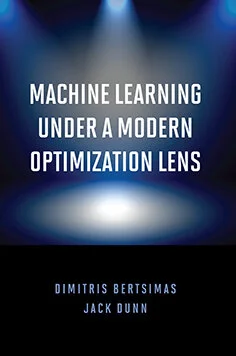Machine Learning Under a Modern Optimization Lens
Machine Learning Under a Modern Optimization Lens
by Dimitris Bertsimas and Jack Dunn
This book was awarded the 2021 INFORMS Frederick W. Lanchester Prize, which recognizes the best contribution to operations research and the management sciences published in English in the past five years. The Lanchester Prize, established in 1954, is the highest honor bestowed by INFORMS.
Structure of the book:
Part I covers robust, sparse, nonlinear, holistic regression andextensions.
Part II contains optimal classification and regression trees.
Part III outlines prescriptive MLmethods.
Part IV shows the power of optimization over randomization in design of experiments, exceptional responders, stable regression and the bootstrap.
Part V describes unsupervised methods in ML: optimal missing data imputation and interpretable clustering.
Part VI develops matrix ML methods: sparse PCA, sparse inversecovariance estimation, factor analysis, matrix and tensor completion.
Part VII demonstrates how ML leads to interpretable optimization.
Philosophical principles of the book:
Interpretability is materially important in the realworld.
Practical tractability not polynomial solvability leads to real world impact.
NP-hardness is an opportunity not anobstacle.
ML is inherently linked to optimization not probability theory. Data represent an objective reality; models only exist in our imagination.
Optimization has a significant edge over randomization.
The ultimate objective in the real world is prescription,not prediction.

